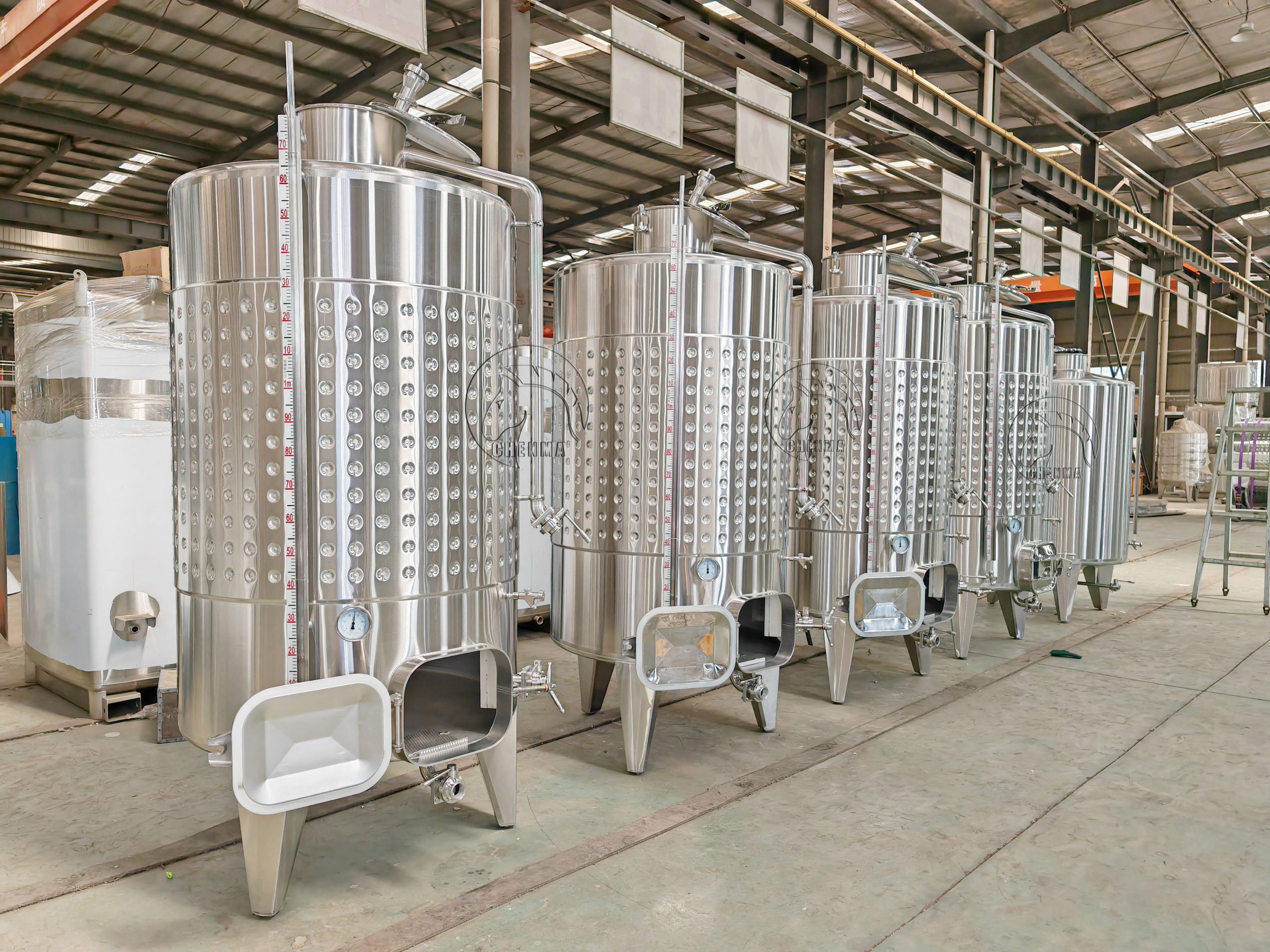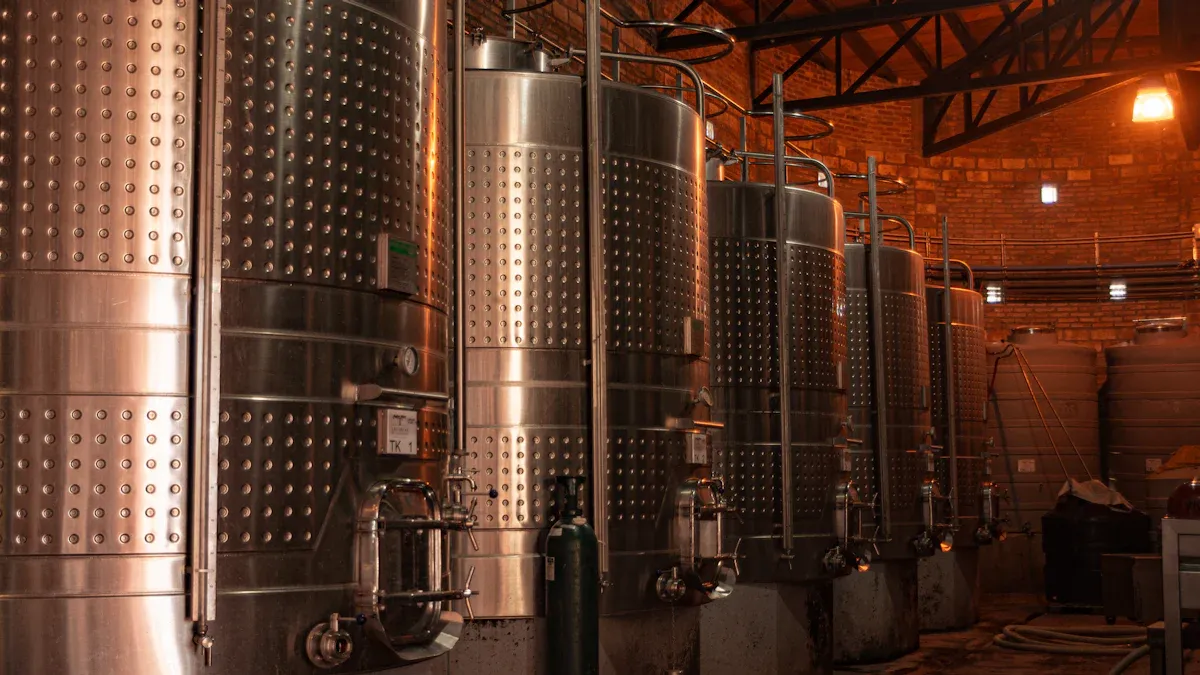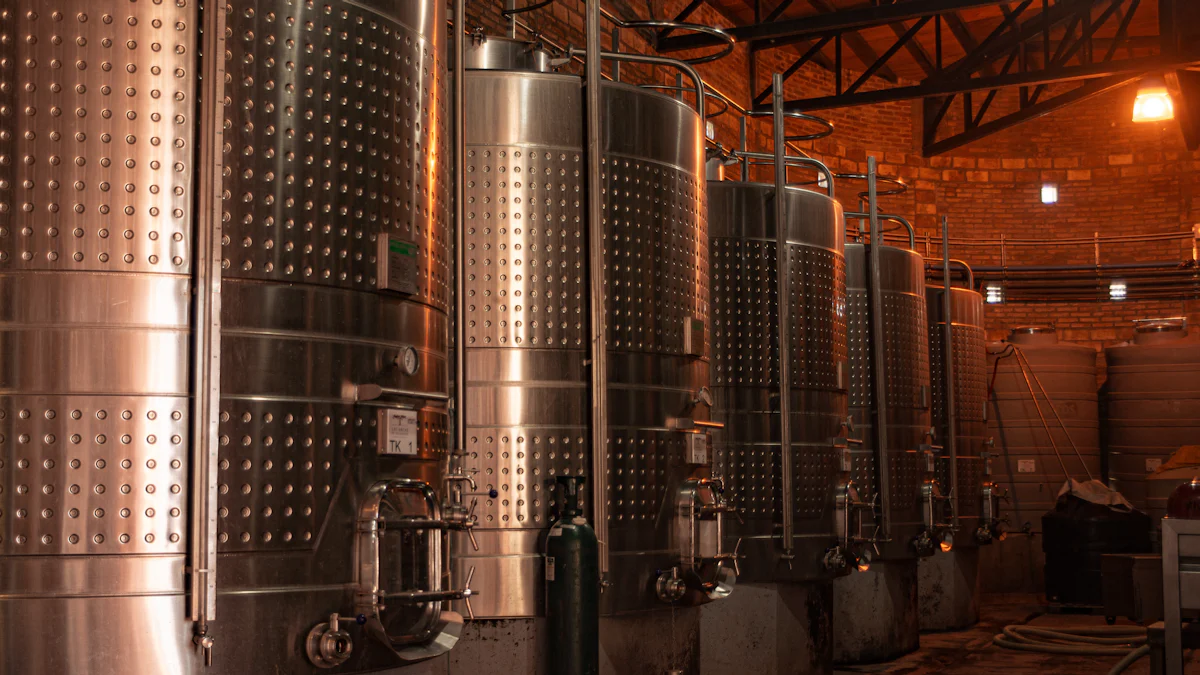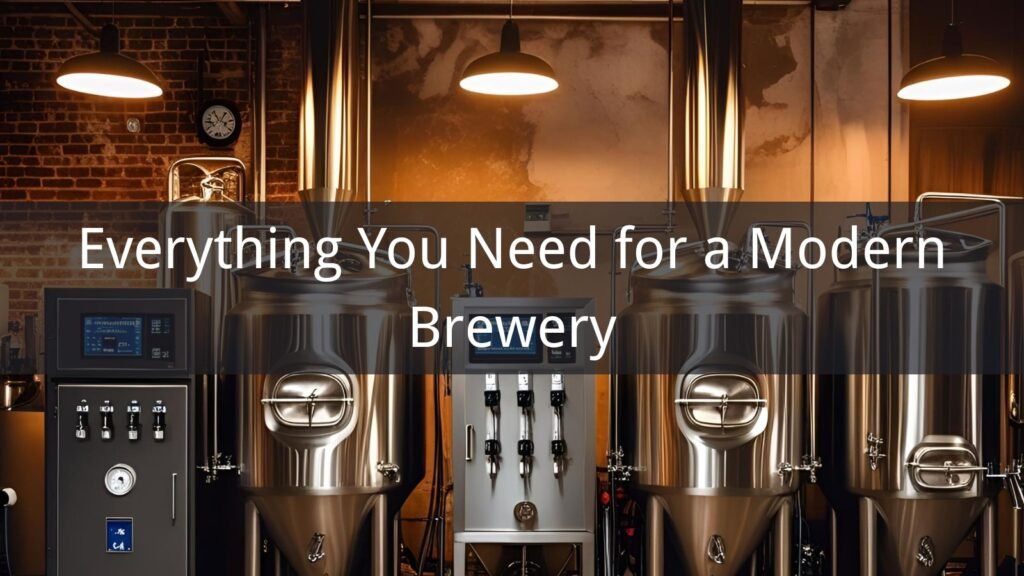
The craft brewing industry has experienced unprecedented growth, with new breweries opening daily across the globe. Success in this competitive market requires more than just exceptional recipes – it demands professional-grade industrial beer brewing equipment that ensures consistent quality, operational efficiency, and scalability. Modern brewing operations rely on sophisticated stainless steel systems, automated controls, and integrated solutions that transform raw ingredients into world-class beer. Whether you’re planning your first brewery or expanding existing operations, understanding the critical components of industrial brewing equipment is essential for long-term success.
Table of Contents
- What is Industrial Beer Brewing Equipment?
- Why Is Modern Brewing Equipment Essential for Commercial Breweries?
- Core Components: What Makes Up a Brewhouse?
- What’s the Full Brewing Process Step by Step?
- Stainless Steel: Why Is It the Material of Choice?
- Choosing Fermenters and Fermentation Systems
- The Role of Temperature Control & Chilling
- What’s Included in a Turnkey Brewery Solution?
- Cleaning & CIP: How Do You Keep Equipment Hygienic?
- Smart Automation: Modern Trends in Brewery Equipment
- Supporting Equipment: From Grain Mills to Keg Washers
- FAQs: Commercial Brewing Equipment Answered
- Key Buying Tips for Brewery Owners
- Case Study: How Upgrading Equipment Boosts a Brewery
- Key Takeaways for Commercial Brewing Success
What is Industrial Beer Brewing Equipment?
Industrial beer brewing equipment encompasses the comprehensive array of machinery, vessels, and systems required for commercial beer production. Unlike homebrewing setups, industrial brewing equipment is designed for consistent, large-scale production with stringent quality control standards and regulatory compliance requirements.
This equipment category includes everything from grain handling systems and mash tuns to fermentation tanks and packaging lines. Modern industrial brewing systems integrate advanced automation, precise temperature controls, and sanitary design principles that ensure product consistency and safety.
The scale distinguishes industrial equipment from smaller systems – capacity ranges typically span from 7-barrel systems for craft breweries to massive 500+ barrel systems for large-scale production facilities. These systems must meet strict food safety regulations, withstand continuous operation, and provide the reliability essential for commercial success.
| Equipment Category | Primary Function | Capacity Range | Key Features |
|---|---|---|---|
| Brewhouse Systems | Mashing, lautering, boiling | 7-500+ BBL | Automated controls, steam heating |
| Fermentation Vessels | Primary and secondary fermentation | 7-1000+ BBL | Temperature control, conical design |
| Bright Beer Tanks | Conditioning and storage | 7-500+ BBL | Carbonation systems, sampling ports |
| CIP Systems | Automated cleaning | Variable | Chemical dosing, cycle automation |
Why Is Modern Brewing Equipment Essential for Commercial Breweries?
Modern brewing equipment represents the foundation of successful commercial operations, directly impacting product quality, operational efficiency, and profitability. The difference between amateur and professional brewing lies not just in scale, but in the precision, consistency, and reliability that modern equipment provides.
Consistency stands as the primary advantage of professional equipment. Consumers expect identical taste profiles every time they purchase a particular beer. Modern brewing systems achieve this through precise temperature controls, automated timing systems, and standardized processes that eliminate human variability.
Efficiency improvements from modern equipment significantly impact profitability. Automated systems reduce labor costs, minimize waste, and optimize resource utilization. Energy-efficient designs reduce operational costs while environmentally conscious features appeal to modern consumers and reduce regulatory compliance costs.
Quality assurance capabilities built into modern systems prevent contamination, ensure proper fermentation conditions, and maintain product integrity throughout the production process. These features protect both product quality and brand reputation while reducing waste from batch failures.
Scalability features allow breweries to grow without complete equipment replacement. Modular designs, expandable control systems, and standardized connections facilitate capacity increases as demand grows, protecting initial equipment investments.
Core Components: What Makes Up a Brewhouse?
The brewhouse serves as the heart of any brewing operation, where raw ingredients transform into the wort that eventually becomes beer. Understanding brewhouse components is crucial for brewery owners, as these systems represent significant capital investments and directly impact production capabilities.
The mash tun begins the brewing process by combining milled grains with heated water to extract fermentable sugars. Modern mash tuns feature automated temperature controls, mixing systems, and insulation that ensures optimal enzyme activity and consistent extraction rates. Advanced designs incorporate steam heating jackets and variable-speed agitators that provide precise control over mashing conditions.
Lauter tuns separate the liquid wort from spent grain through specialized false bottoms and raking systems. Professional lauter tuns feature automated rake drives, variable-speed operation, and integrated sparge systems that maximize extract yield while minimizing processing time. Some modern systems combine mashing and lautering functions in single vessels to reduce space requirements and capital costs.
The brew kettle performs multiple critical functions including wort boiling, hop addition, and protein coagulation. Modern kettles incorporate efficient heating systems, vapor condensation equipment, and integrated hop dosing systems. Advanced designs feature external heating systems that provide gentle, uniform heating while reducing energy consumption and improving product quality.
Whirlpool tanks remove hot break material and hop debris through centrifugal separation. Professional whirlpools feature tangential inlet designs, optimized outlet configurations, and integrated cooling connections that prepare wort for fermentation while removing unwanted solids.
Shandong Chenma Machinery Co., Ltd. specializes in integrated brewhouse solutions that optimize these components for maximum efficiency and product quality. Our systems incorporate advanced automation, energy recovery systems, and modular designs that provide flexibility for different brewing styles and production requirements.
What’s the Full Brewing Process Step by Step?
Understanding the complete brewing process helps brewery owners appreciate the equipment requirements and operational considerations at each stage. Modern brewing follows a standardized sequence that transforms raw ingredients into finished beer through carefully controlled biological and chemical processes.
Grain preparation begins with milling, where specialized mills crack grain kernels to expose starches while preserving husk integrity. The milling process affects extraction efficiency and lautering performance, making quality mills essential for consistent operations.
Mashing combines milled grains with heated water in temperature-controlled vessels where enzymes convert starches into fermentable sugars. The process typically involves multiple temperature steps that optimize different enzyme activities, requiring precise temperature control and timing.
Lautering separates the sugar-rich wort from spent grain through careful liquid extraction. This process requires patient operation and proper equipment design to maximize yield while maintaining wort clarity and avoiding off-flavors from excessive extraction.
Wort boiling serves multiple purposes including sterilization, hop utilization, protein coagulation, and flavor development. Modern boiling systems optimize these functions while minimizing energy consumption and preserving desirable flavor compounds.
Fermentation represents the biological transformation of wort into beer through yeast metabolism. This process requires precise temperature control, contamination prevention, and careful monitoring to ensure proper flavor development and alcohol production.
Conditioning and maturation allow flavors to develop and mature while removing unwanted compounds. Modern bright beer tanks provide controlled environments for this critical process while preparing beer for final packaging.
Filtration and packaging complete the process by removing remaining particles and protecting finished beer during distribution. These systems must maintain product quality while providing efficient throughput for commercial operations.
Stainless Steel: Why Is It the Material of Choice?
Stainless steel dominates modern brewery construction due to its unique combination of properties that address the specific challenges of beer production. Understanding why stainless steel is preferred helps brewery owners appreciate the value of quality equipment investments.
Corrosion resistance stands as the primary advantage of stainless steel in brewing applications. Beer contains acids, alcohols, and cleaning chemicals that would rapidly degrade other materials. Grade 304 stainless steel provides excellent resistance to these substances while maintaining structural integrity throughout decades of service.
Sanitary properties make stainless steel ideal for food production applications. The smooth, non-porous surface prevents bacterial growth and allows thorough cleaning. Proper surface finishes eliminate microscopic crevices where contaminants might hide, ensuring consistent product safety.
Thermal properties of stainless steel support efficient heating and cooling operations. While stainless steel has lower thermal conductivity than copper, modern tank designs incorporate features like dimple jackets and coil systems that provide excellent heat transfer efficiency.
Durability ensures long-term value from equipment investments. Quality stainless steel brewing equipment can operate reliably for decades with proper maintenance, making it cost-effective despite higher initial costs compared to alternative materials.
Flavor neutrality prevents metallic tastes or other off-flavors that could compromise beer quality. Unlike some materials that can impart flavors, properly passivated stainless steel remains completely neutral throughout the brewing process.
As a leading manufacturer of stainless steel brewing equipment, Chenma utilizes only premium grade 304 stainless steel with proper surface treatments and sanitary design principles. Our manufacturing processes ensure optimal material properties and long-term reliability.
Choosing Fermenters and Fermentation Systems
Fermentation vessels represent the largest single equipment investment for most breweries and directly impact production capacity, product quality, and operational flexibility. Selecting appropriate fermentation systems requires careful consideration of production goals, space constraints, and operational requirements.
Vessel design significantly affects fermentation performance and beer quality. Conical bottom designs facilitate yeast harvesting and removal while vertical proportions optimize natural convection currents that improve fermentation efficiency. Modern fermenters incorporate features like sample ports, pressure relief systems, and CIP connections that support professional operations.
Temperature control capabilities determine fermentation consistency and flavor development. Professional fermentation systems include dimple jackets, plate heat exchangers, or coil systems that provide precise temperature control throughout the fermentation process. Advanced systems feature multiple temperature zones and automated control systems.
Pressure handling capabilities affect beer style flexibility and carbonation options. Fermenters rated for higher pressures allow for pressure fermentation techniques, spunding operations, and integrated carbonation systems that improve operational efficiency and product quality.
Material selection impacts durability, cleanability, and flavor neutrality. Premium stainless steel construction ensures long-term reliability while proper surface finishes prevent contamination and facilitate thorough cleaning.
Sizing considerations balance production capacity with operational flexibility. Multiple smaller vessels provide greater flexibility for different beer styles and production scheduling, while larger vessels offer economies of scale and reduced per-barrel costs.
Chenma’s fermentation systems incorporate advanced design features including optimized geometry, efficient cooling systems, and comprehensive instrumentation. Our engineers work with brewery owners to select vessel configurations that match specific production requirements and growth plans.
The Role of Temperature Control & Chilling
Temperature control represents one of the most critical aspects of professional brewing, affecting everything from enzyme activity during mashing to yeast performance during fermentation. Modern brewing operations require sophisticated temperature management systems that provide precise, reliable control throughout all process stages.
Key Equipment:
Glycol chilling systems provide the foundation for brewery temperature control by circulating chilled glycol solution to various temperature control zones. These systems feature insulated distribution networks, automated temperature controls, and redundant components that ensure reliable operation.
Heat exchangers facilitate efficient temperature changes during wort processing and beer conditioning. Plate heat exchangers offer compact designs with excellent heat transfer efficiency, while tube-in-tube exchangers provide easier cleaning and maintenance access.
Insulation systems minimize energy consumption while maintaining temperature stability. Professional insulation incorporates moisture barriers, thermal breaks, and protective cladding that ensure long-term effectiveness and easy maintenance access.
Control systems integrate temperature monitoring with automated responses that maintain optimal conditions throughout brewing and fermentation processes. Modern systems feature remote monitoring capabilities, alarm functions, and data logging that support quality assurance and process optimization.
Steam systems provide heating for mashing, boiling, and cleaning operations. Professional steam systems include pressure regulation, condensate recovery, and safety systems that ensure efficient, safe operation.
Cooling towers or air-cooled condensers remove waste heat from chilling systems while minimizing water consumption and operating costs. Proper sizing and maintenance of these systems ensure optimal chilling system performance.
| Process Stage | Temperature Range | Control Precision | Equipment Required |
|---|---|---|---|
| Mashing | 145-170°F | ±2°F | Steam heating, automated controls |
| Fermentation | 60-75°F | ±1°F | Glycol cooling, insulation |
| Conditioning | 32-40°F | ±1°F | Refrigeration, bright tanks |
| Storage | 32-38°F | ±2°F | Walk-in coolers, insulation |
What’s Included in a Turnkey Brewery Solution?
Turnkey brewery solutions provide comprehensive packages that include all equipment, installation, commissioning, and support services necessary for complete brewing operations. These solutions offer significant advantages for brewery owners by providing single-source responsibility and integrated system design.
A true turnkey solution covers:
Process design and engineering services that optimize brewery layout for maximum efficiency and future expansion. Professional engineers analyze production requirements, space constraints, and operational goals to create customized solutions that meet specific brewery needs.
Equipment manufacturing includes all primary and secondary equipment necessary for complete brewing operations. This encompasses brewhouses, fermentation systems, bright beer tanks, CIP systems, and supporting equipment manufactured to consistent quality standards.
Installation and commissioning services ensure proper equipment setup and system integration. Professional installation teams coordinate with local contractors, integrate utilities, and test all systems to ensure optimal performance before handover.
Training programs provide comprehensive education for brewery personnel on equipment operation, maintenance procedures, and safety protocols. Effective training ensures smooth startup operations and optimal long-term performance.
Documentation packages include operation manuals, maintenance schedules, parts lists, and warranty information. Comprehensive documentation supports ongoing operations and facilitates maintenance planning.
Technical support services provide ongoing assistance throughout the equipment lifecycle. This includes troubleshooting assistance, maintenance support, and upgrade options that protect equipment investments.
Shandong Chenma Machinery Co., Ltd. provides comprehensive turnkey solutions that integrate design, manufacturing, installation, and support services. Our experienced team manages entire projects from initial consultation through successful operation, ensuring smooth brewery startups and optimal long-term performance.
Cleaning & CIP: How Do You Keep Equipment Hygienic?
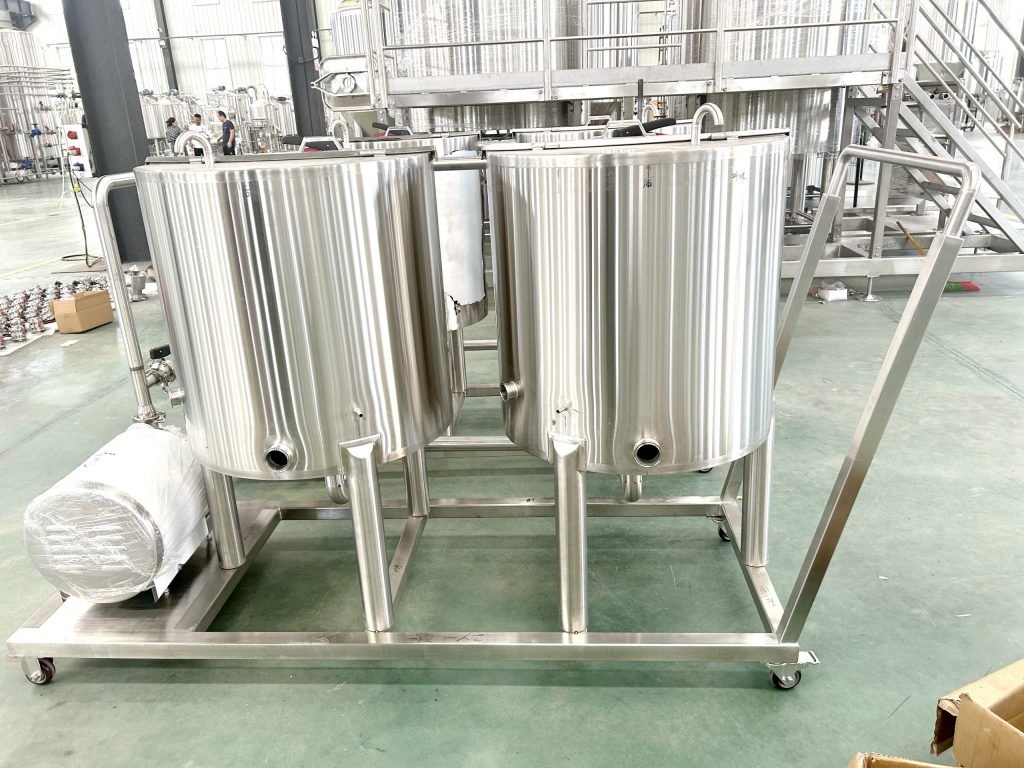
Cleaning and sanitation represent critical aspects of brewery operations that directly impact product quality, safety, and shelf life. Modern Clean-in-Place (CIP) systems automate cleaning processes while ensuring consistent, thorough sanitation of all product contact surfaces.
CIP system design incorporates spray balls, return pumps, chemical dosing systems, and automated controls that provide repeatable cleaning cycles. Professional CIP systems feature multiple cleaning circuits, integrated chemical storage, and comprehensive monitoring systems that ensure effective cleaning while minimizing chemical consumption.
Cleaning chemistry involves carefully formulated solutions that remove different types of soils and sanitize equipment surfaces. Alkaline cleaners remove organic soils, acid cleaners eliminate mineral deposits, and sanitizers destroy microorganisms that could contaminate beer.
Cleaning procedures follow validated protocols that ensure complete soil removal and effective sanitation. Modern CIP systems automate these procedures while providing documentation that supports quality assurance and regulatory compliance requirements.
Water quality affects cleaning effectiveness and equipment longevity. Professional breweries utilize water treatment systems that provide appropriate water quality for both brewing and cleaning operations, minimizing mineral deposits and optimizing chemical effectiveness.
Validation procedures confirm cleaning effectiveness through testing and inspection methods that ensure all surfaces meet sanitation standards. Regular validation maintains cleaning system performance and prevents contamination issues.
Environmental considerations include chemical waste treatment, water conservation, and energy efficiency measures that minimize environmental impact while maintaining effective cleaning operations.
Smart Automation: Modern Trends in Brewery Equipment
Modern brewery automation incorporates advanced control systems, data collection capabilities, and remote monitoring technologies that improve operational efficiency, product consistency, and troubleshooting capabilities. Smart automation represents the future of commercial brewing operations.
Process control systems integrate sensors, actuators, and control logic that automate routine operations while maintaining optimal process conditions. Modern systems feature touchscreen interfaces, recipe management capabilities, and alarm functions that simplify operations and reduce human error.
Data logging and analytics capabilities collect operational data that supports process optimization, quality assurance, and maintenance planning. Advanced systems provide trend analysis, predictive maintenance alerts, and performance optimization recommendations.
Remote monitoring allows brewery personnel to monitor operations from mobile devices or remote locations. This capability improves response times to operational issues while enabling more efficient use of personnel resources.
Integration capabilities connect different brewery systems for coordinated operation and comprehensive data collection. Modern systems feature standardized communication protocols that facilitate equipment integration and data sharing.
Recipe management systems store brewing parameters and automate recipe execution for consistent production. These systems maintain recipe databases, track ingredient usage, and provide batch documentation that supports quality assurance.
Predictive maintenance capabilities analyze equipment performance data to predict maintenance needs and prevent unexpected failures. This approach reduces downtime while optimizing maintenance costs and equipment reliability.
Supporting Equipment: From Grain Mills to Keg Washers
Supporting equipment encompasses the numerous auxiliary systems that enable complete brewery operations. While often overlooked during initial planning, supporting equipment significantly impacts operational efficiency and product quality.
Must-Have Supporting Equipment
Grain handling systems include mills, conveyors, and storage equipment that prepare raw materials for brewing. Modern grain mills feature adjustable gap settings, dust collection systems, and automation interfaces that optimize extraction while minimizing dust and waste.
Water treatment systems provide appropriate water quality for brewing operations through filtration, chemical adjustment, and disinfection processes. Professional water treatment ensures consistent beer quality while protecting equipment from scale and corrosion.
Compressed air systems support pneumatic actuators, instrumentation, and packaging operations. Oil-free compressors with proper filtration and drying equipment ensure contamination-free compressed air for product contact applications.
Laboratory equipment supports quality control operations through testing capabilities that monitor product quality and process performance. Essential laboratory equipment includes pH meters, density measurements, and microbiological testing capabilities.
Packaging equipment includes bottle fillers, can seamers, keg washers, and labeling systems that prepare finished beer for distribution. Modern packaging equipment features sanitary design, automated controls, and integration capabilities that ensure product quality and operational efficiency.
Material handling equipment includes pumps, conveyors, and lifting equipment that move ingredients, work-in-process, and finished products throughout brewery operations. Sanitary pumps and food-grade conveyors ensure product quality while improving operational efficiency.
| Equipment Category | Primary Applications | Key Features | Typical Capacity |
|---|---|---|---|
| Grain Mills | Grain preparation | Adjustable gaps, dust collection | 500-5000 lbs/hr |
| Heat Exchangers | Wort cooling, recovery | Plate design, sanitary | Variable |
| Pumps | Product transfer | Sanitary, CIP capable | 10-500 GPM |
| Keg Washers | Container cleaning | Automated, chemical dosing | 20-200 kegs/hr |
FAQs: Commercial Brewing Equipment Answered
Q: What size brewing system should I start with?
A: System size depends on production goals, market size, and available capital. Most craft breweries start with 7-15 barrel systems that provide adequate production capacity while allowing for reasonable initial investment. Consider growth potential and space for expansion when selecting initial system size.
Q: How much does a complete brewery setup cost?
A: Brewery setup costs vary significantly based on size, automation level, and included equipment. Basic 7-barrel systems start around $150,000-200,000, while larger automated systems can exceed $1 million. Include building improvements, utilities, and supporting equipment in budget planning.
Q: What maintenance is required for brewing equipment?
A: Regular maintenance includes daily cleaning, periodic inspections, seal replacements, and calibration of instruments. Professional equipment typically requires preventive maintenance every 500-1000 operating hours, with major overhauls every 3-5 years depending on usage intensity.
Q: How long does brewery equipment last?
A: Quality stainless steel brewing equipment can operate reliably for 20-30 years with proper maintenance. Critical components like pumps and instrumentation may require replacement every 5-10 years, while vessels and major components often last the life of the brewery.
Q: What certifications should brewing equipment have?
A: Look for equipment certified to food safety standards like 3-A Sanitary Standards or NSF International. Pressure vessels should meet ASME code requirements, and electrical components should have appropriate UL listings for safe operation.
Q: Can I expand my brewery later?
A: Modern brewery design emphasizes expandability through modular equipment, oversized utilities, and standardized connections. Plan for expansion during initial design to minimize future modification costs and operational disruption.
Key Buying Tips for Brewery Owners
Purchasing brewing equipment represents a significant capital investment that affects brewery operations for decades. Following proven buying strategies helps ensure optimal equipment selection and long-term success.
Define production requirements clearly before evaluating equipment options. Consider current needs, growth projections, product mix, and operational goals to establish equipment specifications that match actual requirements rather than wishful thinking.
Evaluate manufacturers based on experience, reputation, and support capabilities. Established manufacturers with brewing industry experience understand operational requirements and provide better long-term support than general equipment suppliers.
Consider total cost of ownership rather than just initial purchase price. Include installation costs, training expenses, maintenance requirements, and energy consumption in equipment evaluations. Quality equipment often provides better long-term value despite higher initial costs.
Plan for expansion and operational flexibility during initial equipment selection. Oversized utilities, modular designs, and standardized connections facilitate future growth while protecting initial investments.
Verify equipment certifications and compliance with applicable regulations. Food safety certifications, pressure vessel codes, and electrical standards ensure safe, legal operation while protecting against liability issues.
Negotiate comprehensive service agreements that include training, documentation, spare parts availability, and technical support. Good manufacturer support significantly impacts operational success and equipment longevity.
Request references from similar brewery operations and visit existing installations when possible. Direct experience from other brewery owners provides valuable insights into equipment performance and manufacturer support quality.
Case Study: How Upgrading Equipment Boosts a Brewery
Regional brewery Riverside Brewing demonstrates the transformative impact of equipment upgrades on operational efficiency and product quality. After five years of operation with basic equipment, the brewery invested in modern automation and expanded capacity to meet growing demand.
Initial Situation: Riverside operated a 15-barrel brewhouse with minimal automation, requiring extensive manual oversight and limiting production consistency. Labor costs consumed 35% of production expenses while quality variations affected customer satisfaction and market growth.
Equipment Upgrades: The brewery invested in automated control systems, upgraded fermentation vessels with precise temperature control, and installed a comprehensive CIP system. New brewing tanks with conical designs improved yeast management and cleaning efficiency.
Results Achieved: Production capacity increased 40% while labor costs decreased to 22% of production expenses. Product consistency improved significantly, enabling expansion into new distribution channels. Energy consumption decreased 25% through improved insulation and heat recovery systems.
Financial Impact: The equipment investment paid for itself within 18 months through increased production, reduced labor costs, and improved product quality. Market expansion opportunities generated additional revenue growth that exceeded initial projections.
Lessons Learned: Investing in quality equipment earlier in brewery development provides better returns than delaying upgrades. Automation reduces operational complexity while improving consistency and profitability. Professional equipment selection and installation services ensure optimal performance and rapid payback.
Key Takeaways for Commercial Brewing Success
Success in commercial brewing depends heavily on equipment selection, system design, and operational execution. Understanding key principles helps brewery owners make informed decisions that support long-term success.
Most Important Things to Remember
Quality equipment investments provide long-term value through improved efficiency, consistent product quality, and reduced operational costs. While initial costs may be higher, quality equipment typically offers better total cost of ownership and operational success.
System integration and automation capabilities significantly impact operational efficiency and product consistency. Modern control systems reduce labor requirements while improving process repeatability and quality assurance.
Proper planning for expansion and flexibility protects initial investments while accommodating business growth. Modular designs, oversized utilities, and standardized connections facilitate future modifications without complete system replacement.
Professional installation and commissioning services ensure optimal equipment performance and operational success. Experienced manufacturers provide valuable expertise during startup while establishing proper operational procedures.
Ongoing technical support and maintenance services protect equipment investments while ensuring reliable long-term operation. Comprehensive service agreements provide peace of mind and operational security.
Working with experienced equipment manufacturers like Shandong Chenma Machinery Co., Ltd. provides access to proven designs, quality manufacturing, and comprehensive support services. Our ISO9001-certified manufacturing processes and comprehensive service offerings ensure successful brewery operations from startup through long-term growth.
For brewery owners planning new installations or equipment upgrades, contact our experienced engineering team at admin@sdchenma.com or WhatsApp: 008618063421809 to discuss your specific requirements. Visit sdchenma.com to explore our comprehensive range of brewing equipment solutions.

